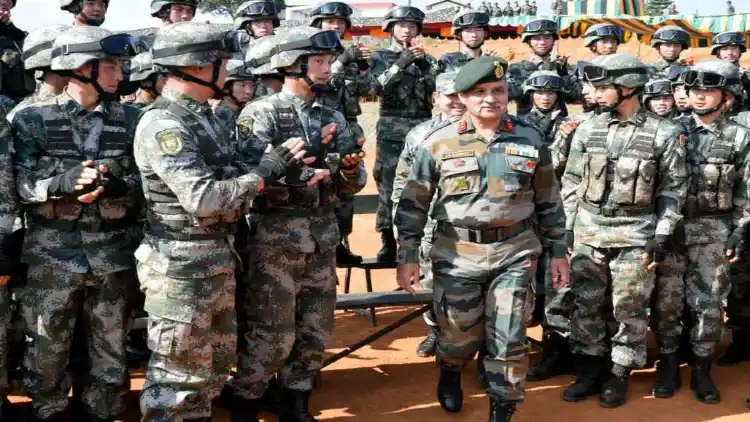
 Deepak Vohra
Deepak Vohra
For the first time in my memory, India has expressed concern over a Chinese law that decrees its territory is sacred and inviolable, and expressed the hope that it will not impact the ongoing negotiations about Ladakh disengagement
The passage of this new law does not confer any legitimacy to the so-called China-Pakistan “Boundary Agreement” of 1963 that India has consistently maintained is an illegal and invalid agreement
Although China and Pakistan settled their so-called border in March1963, China still claims the princely state of Hunza (in the Gilgit Baltistan region) on the specious grounds that it was a tributary state, while Hunza claims much of the territory ceded by Pakistan to China
There is a strange aspect to the 1963 Agreement. Article 6 acknowledges the need for a new settlement after the Kashmir issue is resolved, thereby admitting that Hunza and adjoining areas are part of the dispute.
China has always tried to intimidate us, and we bent over backwards to “understand”, whether it was stapled visas for our officers serving in Kashmir, asylum to the Dalai Lama, or our request to the United Nations to designate Pakistani-based Hafiz Saeed as a global terrorist, or our membership of the Nuclear Supplier’s Group, or our permanent membership of the United Nations Security Council.
It protested the regularization of Sikkim’s status and statehood for Arunachal Pradesh, and goes apoplectic whenever any of our leaders visit Arunachal Pradesh. Our policy toward China over the last 30 years has been unsuccessful.
China sees any concession as a sign of weakness – it responds only to sticks, seldom to carrots and never treats supplicants as equals.
India had raised the issue of incorrect Chinese maps in the 1950s that showed Indian areas as theirs’ in disregard of the Shimla Convention and the McMahon Line.
Senior colleagues tell me that the Chinese responded that the young People’s Republic had not had time to look at the maps printed by the previous Kuomintang regime and that we should not worry. China didn’t say a word even in 1950 when Nehru said that “the McMahon Line is our boundary” and “the frontier from Ladakh to Nepal is defined chiefly by long usage and custom.”
The Chinese never raised any formal objection to the McMahon Line until January 1959, when Zhou Enlai, wrote a letter to Jawaharlal Nehru.
While our military leaders (serving and retired) have publicly (and increasingly) drawn attention to China’s expansionist agenda, our diplomatic comments have been restrained. It is a good strategy, in that the China challenge is not being glossed over at the military level while keeping the window open at the bilateral political level and preserving the diplomatic suppleness needed for our participation in forums such as BRICS, the SCO, even the RIC, where China is present, even as we strengthen ties with the US, deepen our Quad engagement based on adherence to international law and respect for sovereignty.
Ancient civilizational links between India and China, including the spread of Buddhism and its philosophy from India to China, are great, but contemporary India-China relations have been much more influenced by Chinese encounters with British imperialism
For Chinese, India was the western paradise, the birthplace of Buddha and a centre of advanced knowledge and philosophy. This challenged the notion of Chinese centrality and was for this reason rejected at times as an alien influence, but this did not prevent its embrace by the populace as a comforting faith
During the medieval era the port of Calicut maintained a flourishing maritime trade with China. It was described as a pivot point for the 7 voyages undertaken by the Ming dynasty Admiral Zheng. He died in Calicut in 1433 at the end of his last voyage.
The humiliating Opium Wars of 1839-42 and 1856-60 that drained China of silver and enfeebled its citizens with Indian soldiers serving as shock troops shook China deeply by its vulnerability to a British empire which drew its power and resources from its colonial empire in India.
There was also a deep resentment of the prominent Indian traders who flaunted the wealth gained mainly from the opium trade in cities like Shanghai. India was regarded as a failed and fallen country which had been subjugated and enslaved without resistance from its people.
India did very little to change this perception, except for vacuous slogans of bhai-bhai and long harangues in the UN to seat China in the Security Council.
According to a 2018 book by statesman G Parthasarathi’s son, Nehru told his father who was going as Ambassador to China in 1958 that he did not trust the Chinese one bit. He suggested that they were arrogant, hegemonistic and imperialist nation that had, throughout its long history, been characterised by perfidy towards all external powers. So, he advised Parthasarathi to keep an eternal vigil.
Nehru also talked about how Defence Minister VK Krishna Menon was wrong in believing that Communist China would not attack non-aligned India. After attacking India in 1962, Mao Zhedong unilaterally withdrew from some Indian territory stating that he had recovered China’s land.
Today, Mao’s borders are questioned by his grandkids who otherwise swear by his infallible judgment. So what’s new?
A resolute, brave India, with an all-of-people approach, has smashed China. Galwan was a self-goal for China and has seriously undermined Xi Ping’s position, just as the 1962 debacle demolished Jawaharlal Nehru.
The PLA was exposed as a paper dragon, and this has demoralized its leaders.
China’s new border law doesn’t state anything new. Political scientists have traced the concept of exclusive state sovereignty to the Peace of Westphalia (1648), which ended the 30-year War, a conflict fought largely within the Holy Roman Empire from 1618 to 1648 that killed up to 8 million.
A retiring Chinese general reportedly lamented that he regretted not fighting in a war. This reveals the greatest weakness of China's fighting forces, its last major war being in 1979 against Vietnam when it lost some 30,000 troops as per neutral estimates
It then shut up for 40 years till Galwan in 2020
Just a couple of months ago, the Global Times published an amazing article on declining masculinity among young Chinese males, and I quote:
“Young people are less willing and enthusiastic to protect their country.. more and more young people with mental illness…children should be recruited into junior military schools…in order to train a reserve army for the great rejuvenation of the Chinese nation...the media and film and television should idolize more masculine soldiers.”
This shows China has a lot to deal internally to flex its muscles with a neighbour.
(Deepak Vohra is a senior diplomat, special Advisor to Prime Minister on Lesotho, South Sudan and Guinea-Bissau and Special Advisor to Ladakh Autonomous Hill Development Councils, Leh and Kargil)
